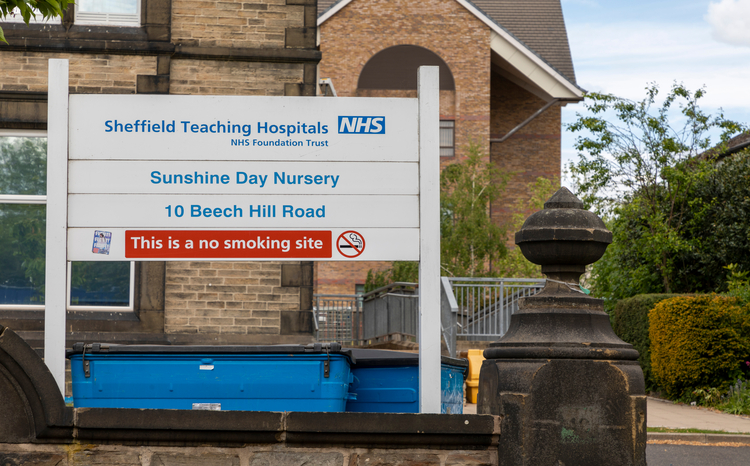Digital Health’s monthly roundup of contracts and go lives
- 7 July 2023

Digital Health’s monthly roundup of contracts and go lives features the deployment of an electronic patient record for East Lancashire Hospitals, Nervecentre’s EPMA go-live at Nottingham University Hospitals and an upgraded medical imaging system from Philips for Wirral University Teaching Hospital.
WUTH deploys Philips PACS to improve medical imaging efficiency
Wirral University Teaching Hospital (WUTH) has implemented Philips PACS, an upgraded medical imaging system that will ensure the trust stays up to date with technology and improves efficiency to benefit both patients and staff.
The project to upgrade the system began in 2021, when the project team installed the hardware servers and network infrastructure necessary for the upgrade to the new system’s software.
Then, from January 2022 to February 2023, the team migrated 4.2 million images of historic study data to the Philips Vue PACS (Picture Archiving and Communication System). Finally, in March 2023, all trust staff made the transition to the new system. All new images are instantly shared on each patient’s record.
The Philips Vue Motion PACS viewer enables WUTH to access both their own and all other images in Cheshire and Merseyside hospitals’ PACS, reducing duplicate imaging and resulting in fewer uploads from external hospitals.
The ‘Regional PACS link’ now allows staff to access all their own, as well as regional images, in one system.
East Lancashire Hospitals NHS Trust EPR goes live
East Lancashire Hospitals NHS Trust went live with its new electronic patient record (EPR), transforming how its staff will work and the care they deliver to patients.
eLancs has been designed to improve patient care across the region, by replacing paper-based notes and records with a new range of digital tools and technologies.
The new EPR ensures that trust clinicians have all the information they need to make better, more effective decisions for their patients. The system gives automatic access to a suite of decision support tools, ensuring all decisions are made based on the best information available.
In addition, eLancs will improve communication across clinicians and teams, minimise duplication and reduce some of the data collection burdens by allowing for automatic data capture.
The trust has ambitious plans for the future of eLancs, noting on a webpage about the project: “We’re currently working with Lancashire and South Cumbria Integrated Care System and other regional providers in development of a solution that will feed into local trusts. It is important patients can move smoothly between services.”
University Hospitals of Leicester chooses Accurx for innovation partnership
University Hospitals of Leicester NHS Trust (UHL) has signed an Innovation Partnership agreement with Accurx, a software company joining up healthcare communication around each patient.
Like all NHS Trusts, UHL is aiming to bring down its elective backlog and address long waiting lists for patients. During the Covid-19 pandemic, UHL experienced an 85% increase in its waiting list, meaning it has one of the toughest recovery trajectories of any large Acute trust.
UHL is approaching this through the Innovation Partnership with Accurx, whose intuitive software is being used across multiple services in the trust to administratively and clinically validate waiting lists, as well as reduce unnecessary appointments and DNAs.
The partnership sees Accurx and UHL working closely and collaboratively to design solutions and build products to meet UHL’s elective recovery needs. UHL and Accurx meet monthly with clinical, technical and operational representatives from UHL, to review progress against objectives, ensure technical alignment, identify and manage clinical risk and brainstorm new ideas.
In November 2022, UHL and Accurx set a goal to remove 10,000 patients from the waiting list by March 2023.
Just eight weeks into the partnership, this goal was hit. Today, 17,000 patients have been removed, demonstrating the commitment from UHL to using innovative technology to tackle their backlog.
Nervecentre’s EPMA goes live at Nottingham University Hospitals
Nottingham University Hospitals (NUH) has deployed Nervecentre’s electronic prescribing and medicines administration (ePMA) solution to improve safety, advance its digital maturity, and provide real-time insight into prescribing activities.
The City Hospital (City) and Queen’s Medical Centre (QMC) were transitioned from paper drug charts to Nervecentre over two weekends, with City going first on May 20 and QMC following three weeks later on June 10.
The QMC go-live took place over the hottest weekend of the year and immediately before a three-day junior doctors’ strike. For QMC, the drug charts covering 14,100 prescriptions for more than 800 patients across 40 wards were transcribed into Nervecentre over two days.
Clinicians and operational teams at Nottingham University Hospitals NHS Trust were already heavy users of Nervecentre for a broad set of functionality, including viewing test results, vital signs, clinical noting, hospital at night, sepsis alerts, risk assessments, fluid balance, bed management and porterage.
Adding medication management and discharge summaries helps clinicians by consolidating all the information they need in one place – their mobile device.
Later this year, NUH will add ordering of investigations and the full suite of Emergency Department functionality to further consolidate its digital footprint.
Gloucestershire Hospitals NHS Foundation Trust deploys ePMA
As the next step in Gloucestershire Hospitals NHS Foundation Trust’s five-year digital transformation journey, it has gone live with an ePMA solution.
Provided by Altera Digital Health, the ePMA is part of the trust’s Sunrise electronic patient record (EPR), which went live in June 2021. The new deployment will help to improve patient flow and safety.
Doctors and nurses working across more than 50 adult inpatient wards across two hospital sites, two emergency departments and a specialist oncology centre, can now automatically order medicines through Sunrise. This means they no longer need to make a physical visit or call the pharmacy to prescribe.
The system allows clinicians to see where they are in the prescribing process, via the tracking boards. This information is available from admission to discharge, and by role and task. Remote access also means that important checks can be done from anywhere.
In addition, the ePMA implementation meant Gloucestershire Hospitals was able to move to electronic discharge summaries, improving timely communication with GPs and supporting early discharge.




